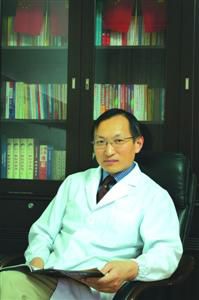

Zhang Chi
"At present, there are indeed difficulties in the diagnosis and treatment of lung cancer in my country."
Not long ago, at the 16th World Conference on Lung Cancer 2015 held in Denver, USA, the academic exchanges between Chinese and foreign oncologists on topics such as precision medicine for lung cancer aroused the deep thinking of Zhou Caicun, director of the oncology department of Shanghai Pulmonary Hospital. .
"The development of medical care in different regions in my country is uneven. As far as Shanghai is concerned, even in the best hospitals in Shanghai, it is difficult for eligible lung cancer patients to receive precise treatment; secondly, even if we find lung cancer targets (by tumor The characteristic site determined by the cell-specific gene), but the anti-tumor targeted drugs that can identify the target to kill tumor cells and prevent their proliferation take a long time from FDA approval to entry for use; third, At present, the scope of targeted drugs that can be included in Shanghai medical insurance is limited. Therefore, to continue on the long road of lung cancer diagnosis and treatment, we need to continue to make new attempts and explorations.”
Precision therapy for lung cancer
we have the right to speak
In Zhou Caicun's specialist clinic, it is not uncommon for female patients to suffer from lung cancer who do not smoke. In the past, Zhou Caicun was very tormented to see their hair loss and gastrointestinal reactions after chemotherapy.
However, the dawn of the long nightclub and the emergence of precision medicine allowed Zhou Caicun to see the light of dawn. "Now, we talk to patients and their families. We take out the patient's lung tissue for biopsy. When the test results confirm that the lung tissue does have a genetic mutation, we will give the patient targeted therapy and let them take it. Targeted drugs. Those little pills that not only allow them to live longer, better, and more dignified lives, but also simplify cumbersome treatments, and they can even go back to work and treat lung cancer as a for chronic diseases.”
At present, precision medicine is a very hot topic, and many people are paying attention and researching it. In Zhou Caicun's view, precision medicine is a highly personalized and highly targeted diagnosis and treatment model: according to the changes in individual tumor genes, specific treatment methods are guided in a targeted manner. On the patient, let the right patient receive the appropriate treatment, so as to improve the therapeutic effect and avoid over-medication. "The essence of precision treatment of lung cancer has become the focus of attention!"
Zhou Caicun often encounters such family members of lung cancer patients, "They came here for 'precise treatment', and they told me that their family is not short of money, and they can prescribe targeted drugs, as long as the patient is not suffering, no matter how much effort is worth it. Zhou Caicun said with a wry smile, "Not all lung cancer patients are suitable for precise treatment. We must find the tumor target in order to target the drug. Otherwise, we will spend money and delay the treatment time, but without any therapeutic effect, the tumor will grow instead. Now, there are brain metastases, lumbar metastases, and even paralysis, and there is no way to save them at this time."
my country is a country with a high incidence of lung cancer. In Zhou Caicun's eyes, this is not the only reason why my country has a say in precision medicine for lung cancer. "There are a lot of lung cancer patients with EGFR gene mutation in my country. In view of the current situation of lung cancer, we have seized the opportunity well and have done a lot of clinical research on the signaling pathway of EGFR tumor cells. In the world, there are eight Four of the clinical studies on patients with EGFR gene mutation were led and participated by us Chinese.”
Identifying people at high risk of lung cancer
is our urgent need
In all cancer incidence rankings, lung cancer always tops the list. The age of onset of lung cancer in Shanghai is mainly around 70 years old. Although lung cancer prefers men, the gender gap between men and women is gradually narrowing, making the incidence of lung cancer more and more serious. Air pollution and family history make young women who don't smoke and don't enter the kitchen still have the possibility of being "targeted" by lung cancer.
Zeng Jin, when Zhou Caicun was a respiratory doctor, patients with chronic obstructive pulmonary disease and chronic bronchial emphysema were "regular customers" in Zhou Caicun's outpatient clinic. Until the 1980s and 1990s, Zhou Caicun witnessed more and more people suffering from lung cancer. After many patients from rural areas were diagnosed with lung cancer, they had to return home to wait for death because they could not bear the painful treatment process, so Zhou Caicun made a decision. Determined to spend a lot of time and energy researching methods of early diagnosis of lung cancer, so as to provide the best treatment plan for lung cancer patients, this is also the original intention of Zhou Caicun's career transition.
"It is easy to diagnose lung cancer. CT, puncture, bronchoscopy, and EBUS are the best ways to detect lung cancer. The problem is that only 50% of patients with lung tumors can be identified as lung cancer. One-third of patients with lung nodules are lung cancer people, which will definitely cause social panic, so what we urgently need is to find out patients with shadows in the lungs but not lung cancer to reduce the burden on society!" The oriented thinking mode made Zhou Caicun quickly clear the top priority of his work. Of course, this has also become a guideline for leading the oncology department to take the path of characteristic scientific research.
It is the first step in the precise diagnosis and treatment of lung cancer to identify potential patients with suspected lung cancer through molecular typing. For this reason, Zhou Caicun devoted himself to the research of lung cancer driver genes. In Zhou Caicun's eyes, today's lung cancer is not a simple disease, but a series of diseases. If only from the pathological classification, can not get a good treatment effect. On this basis, it is the general trend that lung cancer driver genes determine the treatment strategy.
The signal transduction pathway guided by driver genes determines whether lung cancer cells differentiate into normal cells or become cancerous, and the life or death of cancer cells is determined by driver genes. According to the driver gene, lung cancer can be divided into more than a dozen types, such as EGFR gene mutation, ALK fusion gene, HER2 gene mutation, ROS1 fusion gene, KRAS mutation, etc., which is a molecular classification of lung cancer.
In order to find the driver genes that grow on lung tumors, Shanghai Pulmonary Hospital has established a molecular typing detection platform, and the purpose of establishing this platform is to provide precision medicine for lung cancer. On the detection platform, through detection methods such as small samples, micro samples, cell samples, plasma samples and pleural effusion samples, on the one hand, doctors can take out lung tissue for 80%-90% of lung cancer patients, and perform biopsy and re-biopsy. On the other hand, the driver gene on the patient's tumor cells can also be found by biopsy of lung tissue, so that targeted drugs can be used for precise treatment.
It is worth mentioning that if lung cancer fails the first targeted therapy, when the tumor continues to grow, on the molecular typing detection platform, doctors can still perform lung tissue re-biopsy on 50%-60% of lung cancer patients. For those patients who are not suitable for or cannot tolerate re-biopsy, we can use peripheral blood for liquid biopsy, and use next-generation sequencing or digital PCR to detect the corresponding molecular markers of the patient's cfDNA (cell-free DNA) to detect tumor cells. changes in biological behavior and molecular behavior. In this sense, precision medicine is not just a "flash in the pan" at the time of diagnosis and first treatment, but runs through the entire diagnosis and treatment process.
At the same time, there are many lung cancer patients who are screened for lung shadows. If each patient is screened accurately to clarify the characterization of lung tumors, both the patient's body and mind and the doctor's workload will be affected. is a huge burden. In order to change this situation, Zhou Caicun has done a lot of clinical research and found that patients with pulmonary nodules and positive CTC (circulating tumor cell test) results are the objects that need to be followed up. Select high-risk groups from patients with pulmonary nodules for precise screening, which can well avoid blindness in screening.
Precision medicine, so that doctors are no longer 'alone'
In 2011, OPTIMAL, the first international study comparing targeted drugs and chemotherapy in the first-line treatment of patients with EGFR-mutant lung cancer, was published in the international authoritative oncology journal "Lancet Oncology". "Through the OPTIMAL clinical study, we found that for EGFR-mutated lung cancer patients, targeted therapy can significantly prolong the lifespan of lung cancer patients compared with chemotherapy, and greatly improve the quality of life of patients."
The conclusion of this study has changed the NCCN guidelines. As the first person in Asia to publish the research results, Zhou Caicun's name is not only remembered by his colleagues in the world, but also shows the survival value of precision medicine for lung cancer patients. "Many people used to say that the doctors who treat lung cancer are the most pitiful, and the patients and friends they know will not live for a year. However, through precision medicine, we can find the target, so as to carry out targeted therapy, so that the patient can live 3- Five years, which was simply unimaginable before, and we doctors are no longer 'alone'."
Through the clinical practice guided by the clinical research of OPTIMAL, Zhou Caicun revealed to everyone that patients with lung cancer driver gene mutations should be the first choice for targeted drugs in treatment. However, for lung cancer patients who could not find the driver gene, Zhou Caicun found through a lot of research and practice that AVASTIN (bevacizumab) combined with chemotherapy can make the comprehensive survival rate of patients reach more than 2 years. It is a qualitative leap in the field of lung cancer diagnosis and treatment.
In the future, the oncology department led by Zhou Caicun will continue to focus on precision medicine for lung cancer, apply precision medicine to the early diagnosis of lung cancer and treatment at different stages, carry out precision medicine for lung cancer to the end, and find new ways to explore the diagnosis and treatment of lung cancer in my country. opportunity.
Zhou Caicun Chief Physician, Professor, Doctoral Supervisor. Director of the Department of Oncology, Shanghai Pulmonary Hospital Affiliated to Tongji University. Director of the Oncology Institute of Tongji University School of Medicine, Director of the Department of Oncology, and a leading talent in Shanghai. He has successively presided over the Ministry of Science and Technology 863, the National Natural Science Foundation of China and a number of major research projects in Shanghai.
Source: Morning News (Shanghai)
National unified service hotline: +86 021-66289710
Tel: 021-66289781
Shanghai Longyao Biotechnology Co., Ltd.